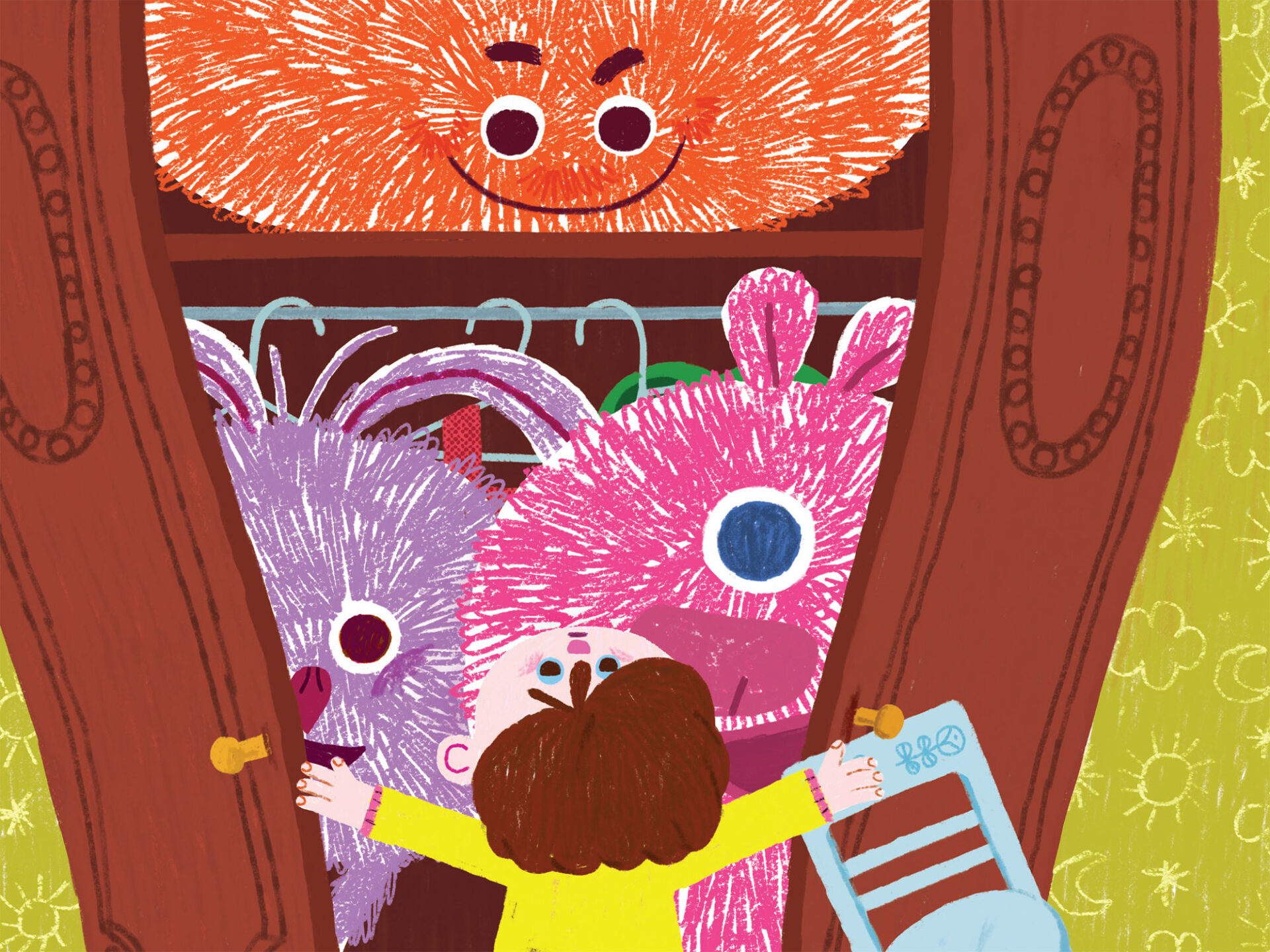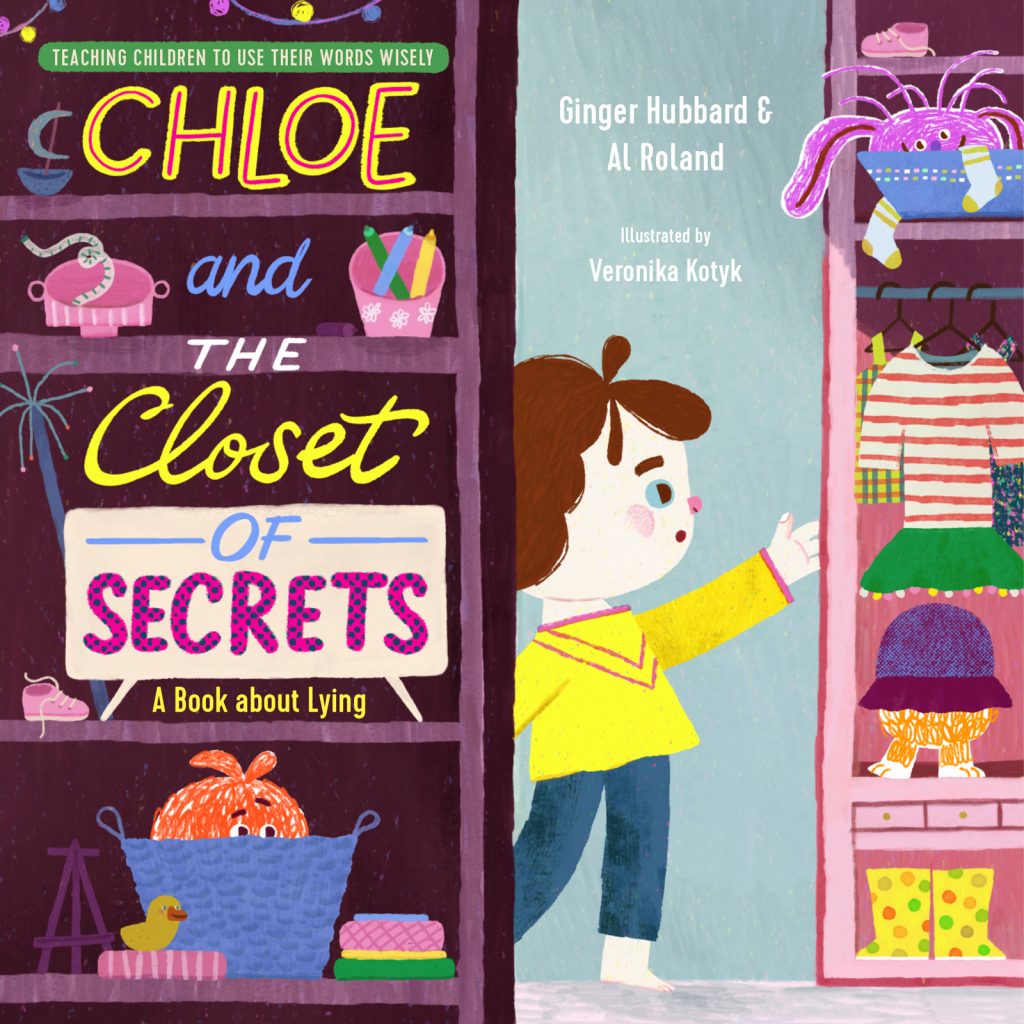When children tell lies or whine to get what they want, the problem isn’t just the words that they use or how they say it. Instead, when a child acts out verbally, it’s important to get to the heart of the matter. Rather than focusing on behavior modification, the new Teaching Children to Use Their Words Wisely series written by Ginger Hubbard and Al Roland places a strong emphasis on the why behind the behavior.
In Chloe and the Closet of Secrets: A Book About Lying, Chloe has a sneaky habit of making up stories. She thinks it’s no big deal, but one day crazy little fluffs appear every time she tells a lie. Chloe starts stuffing the fluffs in her closet, but soon it’s almost ready to burst. Not only that, she realizes that her lies are sinful and are hurting her relationships. But after her father confesses his own lie and asks God for forgiveness, Chloe gains the courage to let out all of her secrets.
Most children (and adults too) struggle with being completely truthful. Even though we know it’s wrong to not tell the whole truth, it’s still hard to help a child understand why. Hubbard and Roland give parents sound recommendations for helping their children (and themselves) learn to speak the truth. The parent section in the back offers advice to help children understand what a lie is, some reasons that they lie, and the power of confession and forgiveness.
In the following interview, Ginger shares more about what to do when your child has a problem with lying.
Q: Please introduce us to your new series, Teaching Children to Use Their Words Wisely. What inspired you and coauthor Al Roland to create the series?
As a conference speaker, I have listened to parents all over the country express heartache over their inability to help their children get a handle on tongue-related offences. So many children today are in bondage to enslaving addictions of the tongue, which stem from enslaving sins of the heart. Parents are looking for ways to uproot these issues, address them from a biblical perspective, and point their children to Jesus—who is our only hope for change. I’ve written parenting books to help parents do that, but my coauthor and I wanted to write children’s books to help them grasp these same concepts in fun ways.
Q: Why is lying such a temptation for children (or adults for that matter)? In other words, what’s at the heart of lying?
Lying is often motivated by a love and preservation of self. We exaggerate details in our favor, twisting the truth—even denying the obvious—to make ourselves look good, or we hide facts to protect our reputation or to keep someone else from getting upset.
Lying shows a lack of trust that God is in control. When we lie, we are trying to control another’s response or change the natural outcome of a situation to suit our own interests. Instead of trusting God, we try to make things turn out in ways that are best for ourselves.
Q: What are three methods parents should avoid when dealing with a lying child? Why should parents avoid them?
Parents should not just punish a child for lying. While consequences are a part of training children to not lie, to merely punish a lying child can actually wind up doing more harm than good. What we view asa punishment due to lying, the child will likely view as a pushishment due to us finding out the truth.Thiscan motivate them to become better at lying.
Parents should not respond to a lying child in anger. Anger can cause the child to fear admitting that he lied and dig his heels in even deeper to try and cover the lie. Also, an angry response will stir anger in our children. Proverbs 15:1 says, “A gentle answer turns away wrath, but a harsh word stirs up anger.”
Parents should not put labels on a lying child. If we are absolutely certain the child has lied, it’s better to address the fact that he lied, rather than calling him a liar. If we call him a liar, we’re labeling him a liar, rather than encouraging him to live in the forgiveness and atonement of Christ.
Q: How can parents help young children understand that lying is a sin and how it hinders their relationship with God and others?
God is the Father of truth (John 14:6). We often fail to appreciate that good relationships—with God and others—are based on honesty and truth and trust. When we lie, we break trust. This is why Paul says, “Do not lie to each other” (Colossians 3:9a) and why he tells us to “speak truthfully” (Ephesians 4:25). God wants us to love, trust, and stay close to him and to one another. This is why he talks a lot in the Bible about being truthful.
If you want to help your child understand these truths, you might consider asking very simple heart-probing questions. Something like, “Sweetheart, God is the Father of truth, so do you think lying honors or dishonors God?” If he doesn’t answer, don’t get into a power struggle. Just answer for him.
Next, it’s important to explain how lying damages family relationships. You might say something along the lines of, “Not only does God hate a lying tongue because it dishonors him, but family relationships are built on trust. When you lie, trust in the relationship is broken. It’s so important that we keep trust in our relationship and that we honor God by being truthful.”
Q: Parents love practical examples. Can you share an example of a child telling a specific lie and how a parent might address it from a heart-oriented perspective?
When my daughter Alex was young, she knew she was not allowed to play in my makeup bag, but she disobeyed by putting lipstick on our Yorkie. When confronted, she blamed it on an action figure.
Alex was caught red-handed in telling a lie, but I didn’t want to discourage her by labeling her a liar. Because I wanted to keep her focus on who she is in Christ, I said, “Alex, you told a lie, but you are not a liar. That is not who you are. You are a forgiven child of God, and because of his grace, you can walk in truth.”
We talked more about how lying dishonors God and others, and how it breaks trust in relationships. After I disciplined her, she had a clean slate of forgiveness. The matter was dropped, her burden was lifted, and her heart was lighter.
Q: What about those gray areas? What if the parent thinks their child is lying, but isn’t 100% certain?
If you are not 100% certain as to whether or not your child is lying, I encourage you to err on the side of mercy. Sir William Blackstone coined the saying, “Better that ten guilty people escape than that one innocent suffer.” To be accused of lying when telling the truth can be devastating for children. We don’t want them to feel that we have an ongoing, suspicious expectation of them lying that would discourage them from walking in truth.
If your gut is telling you that your child is lying but you’re not 100% certain, pray that God would bring it to light so that you might have the opportunity to point him to the atonement of Christ. Don’t stress over the possibility that your child has gotten away with a lie due of your uncertainty. If he’s really struggling with lying, he’ll lie again in a situation where you are certain, giving you the opportunity to train him in truth.
Q: How does Chloe and the Closet of Secrets help children learn the importance of being truthful?
In the story, Chloe thinks that making up stories is no big deal, but one day, little “fluffs” start appearing every time she tells a lie. Chloe tries to hide her secrets by stuffing the fluffs in her closet, but soon the closet is so full it’s ready to burst. Later in the story, Chloe’s dad winds up confessing a lie he told and asking forgiveness, which God uses to help Chloe realize that her lies are sinful and are hurting her relationships. Her dad’s confession also gives Chloe the courage to confess her own lies and ask forgiveness.
Q: In the story, Chloe’s dad has to confess his own lie. How important is it for parents to be open and transparent with their children about their own struggles?
It’s important for kids to know that their parents are sinners in need of a Savior just like they are. When we admit our own struggles at age-appropriate levels and let our children witness us seeking Jesus for help with those struggles, it encourages them to do the same. We want to model for our kids what the conviction of the Holy Spirit looks like and how we are to rightly respond to conviction with repentance.
Chloe and the Closet of Secrets
Chloe has a sneaky habit of making up stories. She thinks it’s no big deal, but one day crazy little fluffs appear every time she tells a lie. Chloe starts stuffing the fluffs in her closet, but soon it’s almost ready to burst. Not only that, she realizes that her lies are sinful and are hurting her relationships.






